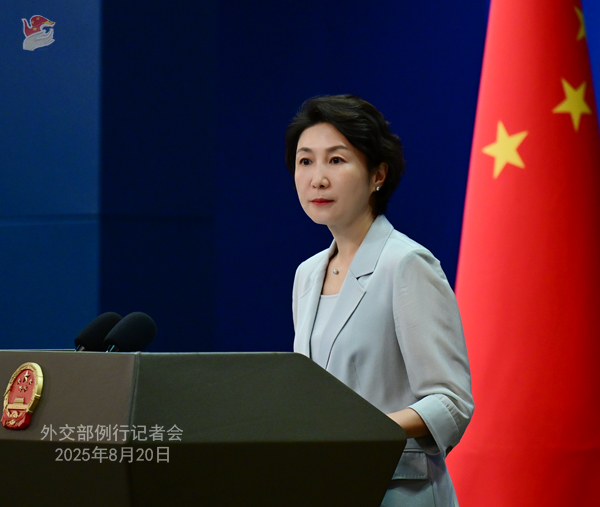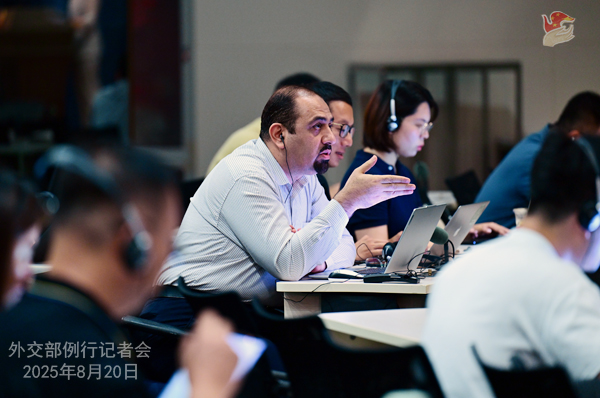
People’s Republic of China


Reuters: At this morning’s press conference on preparations for next month’s military parade, there was no mention of participating foreign troops or the attendance of foreign leaders. Is the Foreign Ministry able to provide us an update on this aspect?
Mao Ning: Thank you for your interest. Information will be released in due time.
CCTV: Foreign Minister Wang Yi just concluded his visit to India. The visit drew close attention. Can you further brief us on the visit?
Mao Ning: Foreign Minister Wang Yi visited India from August 18 to 20 upon invitation where he met with Prime Minister Narendra Modi, held talks with Minister of External Affairs S. Jaishankar and together with India’s National Security Adviser Shri Ajit Doval co-chaired the 24th Round of Talks Between the Special Representatives of China and India on the Boundary Question.
During Foreign Minister Wang Yi’s visit, the two sides agreed on resuming dialogue mechanisms in various fields, deepening mutually beneficial cooperation, upholding multilateralism, jointly dealing with global challenges and opposing unilateral bullying acts. On the boundary question, the two sides reached new common understandings, agreeing to conduct normalized management and control, maintain peace and tranquility in the border areas, properly address areas of sensitivity, and initiate boundary negotiations in areas where conditions are met.
Foreign Minister Wang Yi noted that in October last year, President Xi Jinping had a successful meeting with Prime Minister Narendra Modi in Kazan, enabling a reset and fresh start of China-India relations. The two sides have since earnestly implemented the important common understandings reached between the two leaders and taken the bilateral relationship into a new process of improvement and development. This did not come easy and needs to be cherished. As each other’s neighbors and two major developing countries, China and India share similar philosophies and extensive common interests. There is all the more reason for the two countries to trust and support each other. The current circumstances further highlight the strategic significance of China-India relations and the strategic value of bilateral cooperation.
The Indian side noted that India and China are partners, not adversaries, and that a stable, cooperative and forward-looking relationship between India and China is in the mutual interest of the two countries. The two sides need to enhance communication, deepen mutual understanding, and expand cooperation to demonstrate the immense potential and bright prospects of India-China cooperation to the world.
The two sides agreed to step up exchanges and cooperation in various fields, promote the sustained and steady growth of China-India ties, deliver more for the two peoples and make the two civilizations’ due contribution to human progress.
Al Jazeera: The war in Gaza today has reached 685 days and is in the shadow of what has been seen as starvation policy by Israel. Yesterday, there was a press conference in Qatar by the Qatar foreign minister’s spokesman, and he said that Hamas has agreed on a draft by mediators. And even the foreign minister of Egypt has mentioned that the Palestinian side has agreed on a draft of a permanent ceasefire. Some analysts say that now the ball is on the Israeli side. Israel has a choice of going to that ceasefire or going into the plan of reoccupying Gaza. How would China see the situation in Gaza in the shadow of all these details?
Mao Ning: China is closely following the situation in Gaza and hopes an early ceasefire arrangement could be reached to deescalate the situation and ease the humanitarian crisis.
RIA Novosti: The Eastern Economic Forum will be held in early September in Vladivostok. Last year’s forum was attended by Vice President Han Zheng. Does China plan to send a delegation to this year’s Eastern Economic Forum?
Mao Ning: The Eastern Economic Forum is an important platform for exchanges, mutual learning, and common development among regional countries. China, as always, supports Russia in hosting a successful forum. As for your specific question, I have no information to offer at the moment.
Bloomberg: The U.S. Treasury Secretary Scott Bessent has indicated in media interviews that the U.S. is satisfied with the current tariffs set up with China. This is seen as a signal that the Trump administration is looking to maintain calm with China prior to the expiration of the tariff deadline in November. Does the Foreign Ministry have any comments on Secretary Bessent’s comments related to this overall satisfaction with the current tariff level?
Mao Ning: I’d refer you to competent authorities for anything specific. We hope the U.S. will work with China, act according to the important common understandings reached by the two presidents during their phone call, make good use of the economic and trade consultation mechanism, and strive for positive outcomes on the basis of equality, respect and mutual benefit.
Al Jazeera: Now there are military drills between Australia and the Philippines off the west of Palawan Island. I think they started a few days ago and they are continuing until August 29. How do you see this phenomenon of expanding the Filipino drills with partners, with India, Australia and the United States, in recent years?
Mao Ning: Military cooperation between countries should be conducive to regional peace and stability, and not target any third party. China will firmly safeguard its territorial sovereignty and maritime rights and interests.




